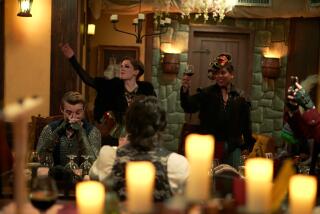Regulars Find the Corner Bar an Oasis in Industrial Desert
At the heart of an industrial labyrinth in Van Nuys, there is a neighborhood bar without a neighborhood.
The narrow street curves through a gray landscape of warehouses, factories, automotive businesses, marble-cutting shops and railroad tracks.
Neon beer signs and Christmas lights pulse in the barred windows of the bar on the corner. A sign advertises drink, food, pool, satellite television--an island of consumption in a sea of production.
The bar overlooks a junkyard: vast heaps of lumber, car skeletons, beach umbrellas, the congealed frenzy of debris penned in by a chain-link fence. Two black dogs of indistinguishable breed trot toward the junkyard past a man pushing a shopping cart loaded with plastic bags. The man hunches beneath a baseball cap and an old coat. A boy walks next to him.
They are watched by a Doberman standing on the roof of a warehouse, a lean silhouette in the pale light of a winter morning.
A few blocks from the bar, the General Motors plant on Van Nuys Boulevard is quiet for the holidays, the parking lot barren and melancholy--a grace period between a grim 1990 and an uncertain 1991.
A few blocks from the bar is one of the deadliest spots in the San Fernando Valley, the Blythe Street gauntlet, where an outsider’s car is stopped by a barricade erected to thwart drug trafficking. As the car turns back, it is swarmed suddenly by youths in black poplin jackets, close-cropped hair and wool caps. They gesture and shout, one of them brandishing a stick with a mocking nonchalance; around here, assault rifles come out when the sun goes down.
But at about 10 a.m. on a cold Friday, the last Friday of the year, the bar is an oasis, part of a far-flung archipelago of weekday urban refuges for anybody anywhere who has to go to work soon, or forget about work fast.
Or find something to do in the morning instead of work.
“Chivas, right?” The red-haired waitress thumps a shot glass in front of the mailman. “That’s what you usually have, right?”
The mailman is the only customer at the red, L-shaped counter. He murmurs a response, leaning forward, his long, uniformed legs hooked in the stool. The mailman’s hair is pasted back in gray-white waves. He watches the waitress pour a beer chaser then glances at the television in the corner.
The screen shows a cheerleading contest in which trim young men are tossing trim young women impossibly high in the air, a soaring, gleaming whirl of golden hair, skirts and legs.
“Jesus,” the mailman says.
Rows of sports pennants and photographs of athletes in action clutter the walls and ceiling. There is a pool table, a jukebox and electronic dart boards. An electric sign advertises schnapps shooters for $1.50. Trucks rattle the windows periodically, a lumbering, single-file herd.
The Coke tastes vaguely like Windex.
The mailman and the waitress are talking about drinking.
“Who was there the other night?” the mailman says. He looks to be in his 40s.
“Just some people that was drunk,” the waitress says, and they laugh. She is about 15 years younger, short and pale, in a shaggy sweater.
“It was quite a weekend,” the mailman says. “I figured I went through three bottles of Chivas. A bottle of V.O. And looking at what I had to clean up for the garbage man, maybe three cases of beer.”
The waitress lights a cigarette. “I was going to quit.”
“I don’t quit,” the mailman says. “I stop. I don’t say something stupid like quit anymore. You can stop for a minute or you can stop for a week.”
The television fills with images of a young Muhammad Ali--an advertisement for a video of his fights--clowning, jabbing, dancing around a fallen opponent, eyes wide and mouth blazing, strong as a lion and pretty as a girl.
The mailman watches.
About 11:15, two long-haired men enter. They wear sweat shirts and jeans. One man has a ponytail and carries two red-tailed darts in a leather sheath. They greet the waitress, order Budweisers, and are immediately captivated by the high-flying cheerleaders.
“Damn,” says the man with the ponytail, who has a slow drawl and a gargling laugh. “They’re pretty good. Last time I was in here, I had to watch wrassling.”
Two more regulars take stools at the opposite end of the bar: a pinch-faced, elderly man carrying a bundle of papers, who taps a thin cigar rhythmically on an ashtray. And a deep-voiced, dark-haired woman in a skirt, who slides in next to the elderly man and arms herself with a glass of wine.
They launch into a conversation about football and bets, studying the old man’s papers on the bar. The woman pulls a sheaf of $20 bills from her purse.
Another customer asks the waitress about lunch, because the signs plastered on the door and walls announce “kitchen now open” and “food served all day.”
The mailman interrupts, pulling on tinted glasses: “They don’t serve food here no more. Not since they decided they were going broke.”
With that, the mailman buys the waitress and himself a final round. “To your health and whatever else.”
They down the Chivas shots, the beer chasers. The waitress makes a face. The mailman scoops a stack of letters off the bar and heads out, accompanied by “Bad Moon Rising,” which the dart throwers have selected on the jukebox. His mail truck appears and disappears in the barred window.
In the outside world, it is lunchtime.
In the bar on the corner, it is time for another drink.
More to Read
Sign up for Essential California
The most important California stories and recommendations in your inbox every morning.
You may occasionally receive promotional content from the Los Angeles Times.










